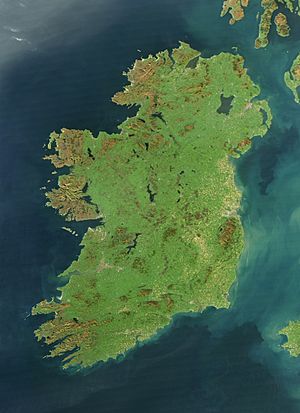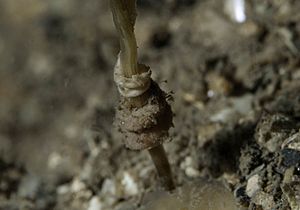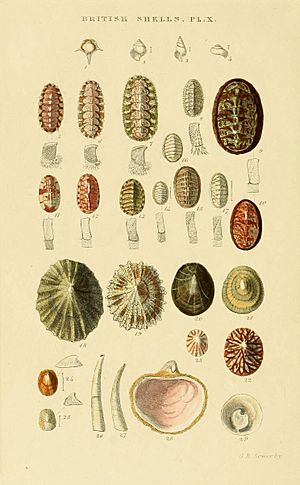List of marine molluscs of Ireland facts for kids
The seas around Ireland are home to many amazing creatures, including a wide variety of marine molluscs. Molluscs are a large group of soft-bodied animals. Many of them, like snails and clams, have hard shells to protect them. Others, like octopuses and slugs, do not.
These fascinating animals live in all sorts of places in the ocean. You can find them in shallow waters near the shore (called the littoral zone). Some live in the open ocean (the pelagic zone), while others prefer the seafloor (the benthic zone). There are even molluscs that thrive in the super deep parts of the ocean! This article lists some of the different types of marine molluscs found in Irish waters.
Contents
Meet the Worm-Like Molluscs (Aplacophora)
These molluscs are quite unusual! They look a bit like worms and don't have shells like most other molluscs. They are often small and live in the deep sea. Scientists have found at least three different kinds of these worm-like molluscs in Ireland.
Solenogastres: Tiny Deep-Sea Dwellers
Solenogastres are a subclass of worm-like molluscs. They are usually very small and live on or near other marine animals, like corals, in the deep ocean.
- Rhopalomenia aglaopheniae
- Neomenia carinata
Caudofoveata: Burrowing Worms
Caudofoveata are another type of worm-like mollusc. They typically burrow into soft sediments on the seafloor.
- Chaetoderma nitidulum
Discover the Sea Cradles (Polyplacophora)
Polyplacophorans are also known as chitons or sea cradles. They are unique because their shells are made of eight separate plates. These plates overlap, allowing the chiton to curl up like an armadillo for protection. Chitons cling tightly to rocks in shallow waters, often in rocky shorelines. At least 13 different species of chitons have been found in Ireland.
Chitons with Hairy Girdles
Some chitons have a tough, leathery band around their shell plates called a girdle. In these species, the girdle can be covered in bristles or hairs.
- Acanthochitona crinita
- Acanthochitona discrepans
- Acanthochitona fascicularis
Colorful and Smooth Chitons
Other chitons have smoother girdles and can come in various colors, helping them blend in with their surroundings.
- Lepidochitona cinerea
- Tonicella marmorea
- Tonicella rubra
Small and Scaly Chitons
Many chitons are quite small and can be hard to spot. Some have tiny scales on their shell plates.
- Callochiton achatinus
- Callochiton septemvalvis
- Hanleya hanleyi
- Lepidopleurus asellus
- Lepidopleurus cancellatus
- Leptochiton asellus
- Leptochiton cancellatus
Snails and Slugs of the Sea (Gastropoda)
The Gastropoda class is huge and includes all marine snails and slugs. This group is very diverse, with animals living in almost every marine habitat. Many have a single, coiled shell, while others, like sea slugs (nudibranchs), have no shell at all.
Clams, Oysters, and Mussels (Bivalvia)
Bivalves are molluscs that have two hinged shells. This class includes familiar animals like clams, oysters, mussels, and scallops. They are often filter feeders, meaning they get their food by filtering tiny particles from the water.
Tusk Shells (Scaphopoda)
Tusk shells are also known as "tooth shells" because of their unique shape. They have a long, curved, tube-like shell that is open at both ends, looking a bit like a miniature elephant's tusk. These molluscs live buried in the sand or mud on the seafloor. At least two species of tusk shells have been found in Irish waters.
- Antalis entalis
- Antalis vulgaris
Octopuses and Squids (Cephalopoda)
Cephalopods are some of the most intelligent and fascinating molluscs. This group includes octopuses, squids, and cuttlefish. They are known for their excellent eyesight, ability to change color, and their many arms or tentacles. At least five species of cephalopods have been recorded in Ireland.
Common Octopuses
Octopuses are well-known for having eight arms and no internal or external shell. They are very clever hunters.
- Eledone cirrhosa (also known as the curled octopus)
- Octopus vulgaris (the common octopus)
Small and Shy Squids
These are smaller types of squids, often found near the seafloor.
- Rossia macrosoma
- Sepiola atlantica (the Atlantic bobtail squid)
The Giant of the Deep
One of the most famous cephalopods is the giant squid, a truly massive creature of the deep ocean.
- Architeuthis dux (the giant squid)
See also
- List of non-marine molluscs of Ireland
Lists of molluscs of surrounding countries:
- List of non-marine molluscs of Great Britain
- List of marine molluscs of Island
 | Bayard Rustin |
 | Jeannette Carter |
 | Jeremiah A. Brown |




